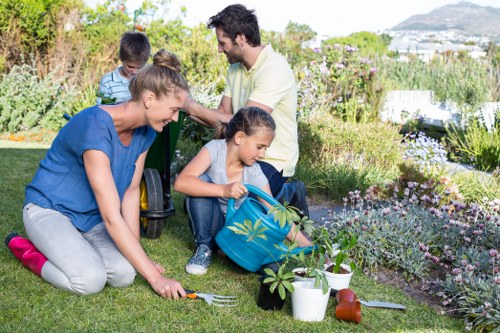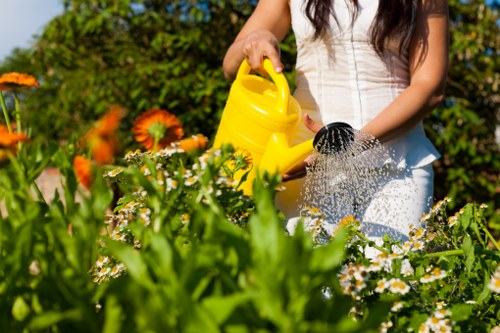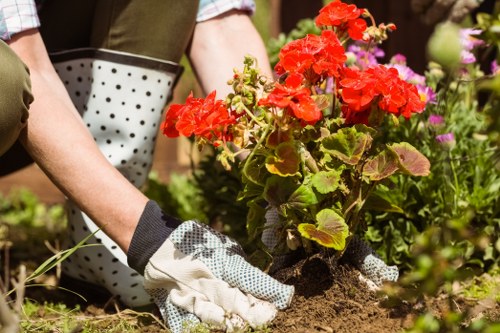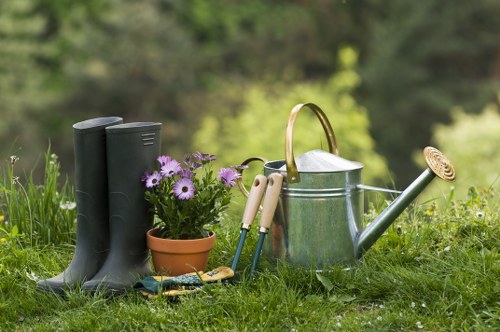Garden Maintenance in Mill Hill
Introduction to Garden Maintenance

Maintaining a beautiful garden in Mill Hill requires dedication, knowledge, and the right tools. Whether you're a seasoned gardener or a beginner, understanding the essentials of garden maintenance can help you achieve a lush and thriving outdoor space.
Garden maintenance involves a variety of tasks, including pruning, weeding, watering, and fertilizing. Each of these activities plays a crucial role in ensuring the health and aesthetics of your garden.
In Mill Hill, the climate and soil conditions present unique challenges and opportunities for gardeners. By tailoring your maintenance routine to the local environment, you can enhance the beauty and sustainability of your garden.
Seasonal Garden Maintenance Tasks

Different seasons bring different requirements for garden maintenance. Understanding these seasonal tasks can help you stay ahead and keep your garden in top shape year-round.
Spring Maintenance
Spring is a critical time for garden maintenance. It's the perfect season to prepare your garden for the growing months ahead.
- Pruning: Remove dead or damaged branches from trees and shrubs to promote healthy growth.
- Soil Preparation: Test and amend your soil with compost or fertilizers to ensure it’s nutrient-rich.
- Planting: Sow seeds or transplant seedlings to take advantage of the growing season.
Summer Maintenance

Summer brings warmth and sunshine, which are essential for plant growth but also require diligent maintenance to manage your garden effectively.
Key summer tasks include regular watering, especially during dry spells, and controlling pests that thrive in the heat.
Mulching can help retain soil moisture and suppress weeds, making your garden more resilient to summer stresses.
Autumn Maintenance

Autumn is the time to prepare your garden for the colder months. Proper maintenance during this season can protect your plants and set the stage for a vibrant garden next spring.
- Leaf Removal: Regularly rake and remove fallen leaves to prevent mold and pests.
- Plant Protection: Apply protective coverings to sensitive plants to shield them from frost.
- Tool Maintenance: Clean and store your gardening tools to extend their lifespan.
Additionally, autumn is an excellent time to plant bulbs that will bloom in the spring, adding early color to your garden.
Essential Tools for Garden Maintenance

Having the right tools is fundamental to effective garden maintenance. Equip yourself with quality tools to make your gardening tasks easier and more efficient.
Pruning Tools
Pruning shears, loppers, and hedge trimmers are essential for maintaining the shape and health of your plants. Invest in sharp, durable tools to ensure clean cuts that promote plant recovery.
Watering Equipment
Efficient watering systems, such as hoses, sprinklers, and drip irrigation, help maintain consistent moisture levels in your garden. Consider installing a timer to automate watering and conserve water.
Soil Care Tools
Tools like spades, hoes, and rakes are necessary for soil preparation and maintenance. Proper soil care ensures your plants have the nutrients they need to thrive.
Choosing the Right Plants for Mill Hill Gardens
Selecting suitable plants is a key aspect of garden maintenance. Plants that are well-suited to Mill Hill’s climate will require less maintenance and be more resilient against local pests and diseases.
Perennials vs. Annuals
Perennials return year after year, reducing the need for replanting and ensuring a consistent garden aesthetic. Examples include lavender, hostas, and peonies.
Annuals provide vibrant color but need to be replanted each year. They are perfect for seasonal displays and trying out new varieties. Examples include petunias, marigolds, and zinnias.
Native Plants
Incorporating native plants can enhance your garden’s sustainability. Native species are adapted to the local climate and soil, requiring less water and maintenance. They also support local wildlife, such as bees and butterflies.
- English Lavender: Fragrant and drought-tolerant, perfect for borders and hedges.
- Hawthorn: A hardy shrub that provides shelter for birds.
- Foxglove: Adds height and color to garden beds, attracting pollinators.
Pest and Disease Management
Effective pest and disease management is crucial for maintaining a healthy garden. Preventative measures and early interventions can save your plants from extensive damage.
Integrated Pest Management (IPM)
IPM is a sustainable approach that combines biological, cultural, and chemical practices to manage pests with minimal environmental impact.
- Monitoring: Regularly inspect your plants for signs of pests and diseases.
- Prevention: Use barriers, such as nets or fences, to keep pests away.
- Control: Apply targeted treatments like organic pesticides when necessary.
Common Pests in Mill Hill
Some common garden pests in Mill Hill include aphids, slugs, and snails. Implementing natural predators, such as ladybugs and nematodes, can help keep these pests under control.
Watering Strategies for Optimal Garden Health
Proper watering is essential for plant health, but overwatering or underwatering can lead to problems. Implementing effective watering strategies ensures your garden thrives.
Understanding Plant Water Needs
Different plants have varying water requirements. It's important to understand the specific needs of each plant in your garden to provide appropriate care.
- Deep Watering: Encourage deep root growth by watering thoroughly and infrequently.
- Morning Schedule: Watering in the morning reduces evaporation and allows plants to absorb moisture before the heat of the day.
- Rainwater Harvesting: Collecting rainwater is an eco-friendly way to water your garden.
Drip Irrigation Systems
Drip irrigation delivers water directly to the plant roots, minimizing waste and ensuring efficient moisture distribution. This system is especially beneficial for vegetable gardens and flower beds.
Soil Health and Fertilization
Healthy soil is the foundation of a thriving garden. Proper soil management and fertilization provide the necessary nutrients for plant growth.
Soil Testing
Regular soil testing helps determine nutrient levels and pH balance. Based on the results, you can amend the soil to meet the specific needs of your plants.
Organic vs. Synthetic Fertilizers
Choosing the right fertilizer is crucial for sustainable gardening. Organic fertilizers, such as compost and manure, improve soil structure and provide slow-release nutrients. Synthetic fertilizers offer immediate nutrient availability but should be used sparingly to prevent nutrient runoff and soil degradation.
Composting
Composting is an effective way to recycle garden waste and produce rich, organic matter. Incorporate compost into your soil to enhance fertility and promote healthy plant growth.
Pruning and Trimming Techniques
Pruning and trimming are essential for maintaining the shape, health, and productivity of your plants. Proper techniques ensure that your plants thrive and look their best.
When to Prune
Timing is crucial when it comes to pruning. Different plants require pruning at different times of the year to maximize growth and minimize damage.
- Spring-Flowering Shrubs: Prune immediately after flowering to encourage new growth.
- Shrubs that Bloom in Summer: Prune in late winter or early spring before new growth begins.
- Fruit Trees: Prune during the dormant season to enhance fruit production.
Pruning Techniques
Use clean, sharp tools to make precise cuts. Focus on removing dead or diseased branches, crossing stems, and shaping the plant to maintain its structure.
Lawn Care and Maintenance
A well-maintained lawn enhances the overall appearance of your garden. Regular care ensures that your lawn remains healthy, green, and free of weeds.
Mowing
Proper mowing techniques contribute to lawn health. Keep the grass at an optimal height to promote strong root growth and prevent weed invasion.
Weed Control
Weeds compete with your grass for nutrients and water. Implementing a combination of manual removal and herbicide application can effectively manage weed growth.
Aeration and Overseeding
Aerating your lawn helps improve soil drainage and nutrient absorption. Overseeding fills in bare spots and maintains a dense, vibrant lawn.
Mulching for Garden Health
Mulching is a simple yet effective practice that offers numerous benefits for your garden. It helps retain moisture, suppress weeds, and regulate soil temperature.
Types of Mulch
There are various types of mulch to choose from, each with its unique advantages:
- Organic Mulch: Includes materials like bark, straw, and compost. It enriches the soil as it decomposes.
- Inorganic Mulch: Consists of materials like gravel and plastic. It effectively suppresses weeds but does not improve soil fertility.
- Synthetic Mulch: Made from rubber or recycled materials, providing long-lasting weed control.
Application Tips
Apply mulch to a depth of 2-3 inches around your plants, keeping it away from the stems to prevent rot. Replenish mulch as needed to maintain its effectiveness.
Garden Maintenance Tips for Beginners
Starting a garden can be overwhelming, but with the right tips, even beginners can achieve success. Here are some essential garden maintenance tips to help you get started:
- Plan Your Garden: Design your garden layout based on plant requirements and aesthetics.
- Start Small: Begin with a manageable garden size and gradually expand as you gain experience.
- Research Plants: Choose plants that are well-suited to your climate and soil conditions.
- Consistent Care: Establish a regular maintenance routine to keep your garden healthy.
- Learn and Adapt: Stay informed about gardening best practices and be willing to adjust your methods as needed.
Common Mistakes to Avoid
Even experienced gardeners can make mistakes. Avoid these common pitfalls to ensure your garden thrives:
- Overwatering: Too much water can lead to root rot and attract pests. Water your plants according to their specific needs.
- Ignoring Soil Health: Healthy soil is key to plant success. Regularly test and amend your soil to maintain its fertility.
- Neglecting Pest Control: Early detection and management of pests prevent extensive damage to your garden.
- Poor Plant Selection: Choose plants that are appropriate for your garden’s conditions to reduce maintenance efforts.
Resources for Further Learning
Enhance your gardening knowledge by exploring local gardening workshops, online resources, and gardening books. Joining a local gardening club in Mill Hill can also provide valuable insights and support.
Remember, gardening is a continuous learning process. Stay patient and enjoy the journey of cultivating a beautiful and sustainable garden.
Contact us today to learn more about professional garden maintenance services in Mill Hill and let us help you create the garden of your dreams!